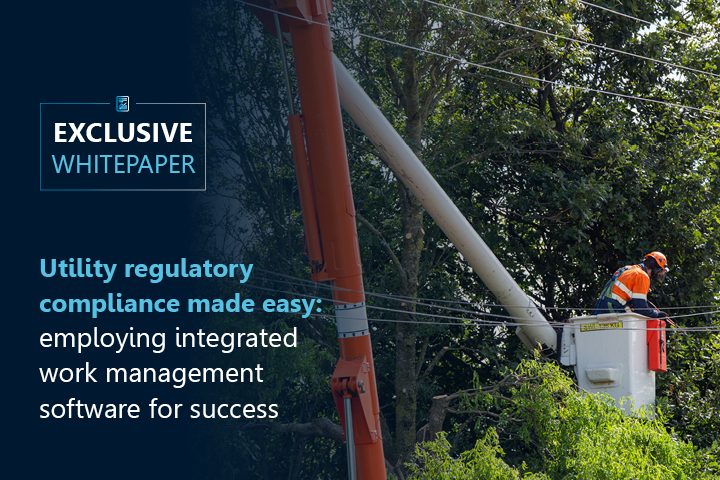articles
Eight ways work management software improves your daily working life
15 June 2022
Work management software (WMS) is designed to provide a business or organisation with tools that can optimise processes across an entire workforce, ensuring all staff and parties involved are on the same page.
When it comes to making work flow easier and more efficient, WMS offers an effective and highly personalised solution which can provide a variety of benefits, from cataloguing data to boosting productivity and much more in between.

Here are the eight ways WMS can improve your organisation's workflows and your staff's daily working lives.
 One place for all your information
One place for all your information
WMS compiles all information into one authoritative source of data, providing accurate and complete resources for all relevant parties and personnel.
This collection of data can include all inspections, tasks, incidents, maintenance history, investigations and analysis, sample collections and lab investigations. When the time comes to recall or handover information, it is all easily accessible and shared.
By providing a “big picture” understanding of the organisation, WMS maintains detailed records of all operations to help identify inaccurate or missing data and prevent oversights, ensuring traceability and accountability.
 Access your data anywhere at any time
Access your data anywhere at any time
By having everything in one place, WMS can be used in the office, in-field or at home, removing the need to exchange forms and spreadsheets between relevant departments and personnel all the time.
Whether an organisation has personnel in various locations or staff working from home, WMS is online and cloud-based, making it convenient and accessible for all.
This streamlining ensures tasks, programs and information can be accessed anywhere at any time, especially for remote work and reducing data handling.
 Reclaim and focus your team's time
Reclaim and focus your team's time
With a comprehensive and regularly updated management system, staff time can be freed up and redirected to other priorities.
WMS can save personnel time as a management system can automate processes such as billing and collating information. Information is then stored and tracked accurately in the system, which saves staff from doing it manually.
Using and recalling information then becomes intuitive and convenient, creating opportunities for staff to focus on other important tasks rather than tedious ones.
 Build and create your own workflows and forms
Build and create your own workflows and forms
Not only can WMS collect information, but it can also be used to create workflows and forms, making management and operations highly personalised.
With consistent and individualised processes and forms, an organisation can take care of all of its work cases, tasks, audits, inspections, corrective actions and reporting. WMS works effectively because it is tailored to suit the particular needs of a business and staff.
Managing a system which is uniquely tailored to suit a business’ workflows and goals increases transparency of work processes and communication, allowing any and all staff to resolve issues quickly.
 Visualise your data to gain insights
Visualise your data to gain insights
When using a management system, it is easy to visualise data to identify trends and opportunities. WMS can facilitate integrated financial reporting, geospatial maps for planning and detailed reviews of processes.
This visualisation can help organisations come up with preventative actions before incidents happen or optimise resource utilisation, ensuring continuous improvement and competitiveness of a business. Data can be accessed or extracted easily when you need them.
In terms of incident response, problems can be traced back to their source because of the detailed records and data collection.
 Assistance in regulatory compliance
Assistance in regulatory compliance
Having extensive and reliable records can help especially with regulatory compliance, which requires documents and processes, such as audits, inspections and reports, to be readily available when regulatory bodies demand them.
WMS can help businesses keep track of any changes to regulations or industry requirements for both staff and any relevant parties such as contractors and suppliers.
Keeping up with ever-changing regulatory obligations and reporting can be difficult and time-consuming without a management system. Instead of a reactive approach to compliance, businesses and organisations can use WMS to adequately prepare and maintain consistent standards and processes to adhere to regulations.
Storing, collating and having relevant data ready can ensure that whatever is required for insurance or litigation purposes is on-hand when needed, which provides confidence for all parties involved.
 Flexibility to adapt to changing requirements
Flexibility to adapt to changing requirements
WMS can offer flexibility when it comes to adapting processes and workflows to meet changing standards, demands and environments.
A management system is designed to help identify areas of improvement, with the ability to alert staff to possible hazards in real-time to encourage preventative rather than retroactive measures.
When it comes to meeting organisational goals, WMS enables businesses to monitor and adjust their actions to ensure any initiatives, such as sustainability targets, are successfully achieved.
For customer interaction, WMS provides a single but comprehensive communication hub, which can monitor billing, complaints and social media feeds. Staff can respond not only to incidents, but queries and feedback as well.
 Improve team collaboration
Improve team collaboration
Collaboration within an organisation can be aided by a management system because detailed records and company-wide communication ensures everyone is on the same page about tasks, goals and timelines.
All staff and personnel have access to up-to-date data and information across various departments, which makes decision-making and completing tasks easier and cost-effective.
But when problems do arise, being alerted in real-time and tracing the initial source can help teams work together to come up with effective solutions. Tasks can be assigned to other users to make sure all work is completed.
This all boosts productivity as viewing the progress of tasks or wider initiatives is easy and communication between departments is convenient.
WMS that meets individual needs
Choosing the right WMS is all about finding the software which fits the organisation, rather than forcing a “cookie cutter” digital solution which cannot account for varying requirements.
Xugo is a cloud-based WMS which is highly configurable to the individual needs of your business, making it intuitive to use and personalised in its functions.
Xugo offers all of these benefits listed to enable any organisation or business to continually improve and meet regulatory requirements by providing all the tools needed in one place.
how we have helped others
Streamlining legacy meter exchange replacements
Using Xugo's web and mobile platform, United Energy's office and field teams can easily track the installation of new smart meters and removal of legacy hardware while conducting condition and routine safety checks on existing connections.











